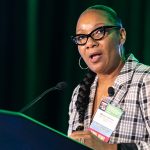-
Continuing the Conversation
The AACR hosts a roundtable to ‘get real’ about cancer health disparities.
by Marci A. Landsmann
-
To Understand Disparities, Look at the Broader Contexts
Researchers at the AACR Annual Meeting 2024 consider ways in which social and economic factors like location affect cancer risk and outcomes.
by Eric Fitzsimmons
-
Overcoming Lung Cancer Stigma With Understanding
Shirley Muñoz wants to use her experience as a younger lung cancer patient to break down barriers to care for her community through translation and advocacy.
by Cameron Walker
-
Women Less Satisfied With Cancer Care
Compared with men, women’s initial cancer symptoms are less likely to be taken seriously.
by Sandra Gordon
-
Thinking Outside the Clinic
Researchers highlight need for outreach and educational programs to address survivorship disparities.
by Thomas Celona
-
Cultural Competence in the Community
Researchers describe their efforts to understand and improve cancer screening and treatment among underserved populations.
by Kevin McLaughlin
-
Working Toward the End of Cancer Health Disparities
AACR conference explores the science of cancer disparities and what needs to be done to improve cancer outcomes for all people.
by Eric Fitzsimmons
-
Risk in the Air
Air pollution can increase a person's risk of developing cancer, a burden that isn't shared equally in every neighborhood.
by Jon Kelvey
-
The Individual Sphere of Influence
Can discussion of health inequities lead to actionable change?
by Marci A. Landsmann
-
Building COVID-19 Vaccine Confidence
Experts discussed how the cancer community can share accurate information and increase confidence in COVID-19 vaccines, both among people with cancer and the general population.
by Kevin McLaughlin
Cancer Talk
Living With Your Loved One’s Prostate Cancer
Christine Ledbetter on the ways her husband’s prostate cancer affected their relationship and finding support as a caregiver.
by Christine Ledbetter
Continuing the ConversationThe AACR hosts a roundtable to ‘get real’ about cancer health disparities.
by Marci A. Landsmann
More Patients Participating in Cancer ResearchA higher proportion of cancer patients are enrolling in research studies than previously thought, but many patients lack the access needed to participate.
by Kyle Bagenstose
Immunotherapy Drug Tarlatamab Approved for Advanced Small Cell Lung CancerThe drug showed promise in treating small cell lung cancer that had progressed during or after chemotherapy.
by Laura Gesualdi-Gilmore














